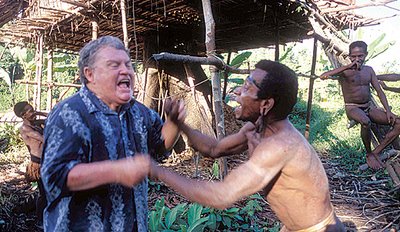Cannibals Explain What Humans Taste Like

Paul Raffaele is an adventurer’s adventurer. He recently went to New Guinea far up river to meet with some of the world’s last cannibals, and wrote about it in Smithsonian Magazine.
“Korowai children with beads about their necks come running to point and giggle as I stagger into the village—several straw huts perched on stilts and overlooking the river. I notice there are no old people here. “The Korowai have hardly any medicine to combat the jungle diseases or cure battle wounds, and so the death rate is high,” Kembaren explains. “People rarely live to middle age.” As van Enk writes, Korowai routinely fall to interclan conflicts; diseases, including malaria, tuberculosis, elephantiasis and anemia, and what he calls “the khakhua complex.” The Korowai have no knowledge of the deadly germs that infest their jungles, and so believe that mysterious deaths must be caused by khakhua, or witches who take on the form of men.
After we eat a dinner of river fish and rice, Boas joins me in a hut and sits cross-legged on the thatched floor, his dark eyes reflecting the gleam from my flashlight, our only source of light. Using Kembaren as translator, he explains why the Korowai kill and eat their fellow tribesmen. It’s because of the khakhua, which comes disguised as a relative or friend of a person he wants to kill. “The khakhua eats the victim’s insides while he sleeps,” Boas explains, “replacing them with fireplace ash so the victim does not know he’s being eaten. The khakhua finally kills the person by shooting a magical arrow into his heart.” When a clan member dies, his or her male relatives and friends seize and kill the khakhua. “Usually, the [dying] victim whispers to his relatives the name of the man he knows is the khakhua,” Boas says. “He may be from the same or another treehouse.”
I ask Boas whether the Korowai eat people for any other reason or eat the bodies of enemies they’ve killed in battle. “Of course not,” he replies, giving me a funny look. “We don’t eat humans, we only eat khakhua.”
“Many khakhua are murdered and eaten each year,” he says, citing information he says he has gained from talking to Korowai who still live in treehouses.
In cannibal folklore, told in numerous books and articles, human flesh is said to be known as “long pig” because of its similar taste. When I mention this, Bailom shakes his head. “Human flesh tastes like young cassowary,” he says, referring to a local ostrich-like bird. At a khakhua meal, he says, both men and women—children do not attend—eat everything but bones, teeth, hair, fingernails and toenails and the penis. “I like the taste of all the body parts,” Bailom says, “but the brains are my favorite.”

March 5, 2009 @ 8:21 am
how cruelty among those peoples…….!!!!!!!
October 4, 2016 @ 7:52 pm
Simply fascinating. I am so glad that there are brave adventurers willing to risk it all to bring us such obscure information.